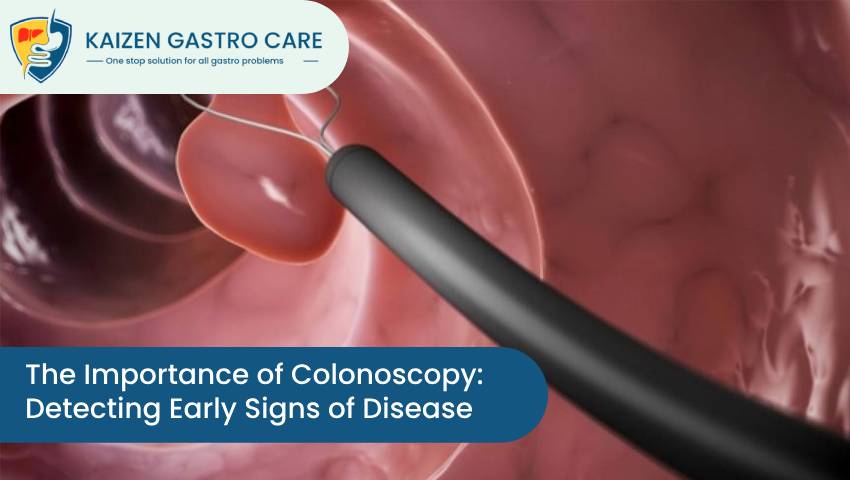
- 02/09/2024
- Kaizen Gastro Care
- 0 Comments
- GI Motility
The Importance of Colonoscopy: Detecting Early Signs of Disease
A colonoscopy is a crucial diagnostic tool that plays an important role in the early detection of colorectal diseases. This procedure involves examining the interior of the colon and rectum with a flexible tube equipped with a camera. Early detection through colonoscopy can be life-saving, especially for diseases such as colorectal cancer and inflammatory bowel diseases.
The best gastroenterology clinic in Pune, Kaizen Gastro Care clinic specialist Dr. Vikrant Kale emphasizes the crucial role of colonoscopy in early disease detection, mainly in identifying potential issues before they escalate into more serious conditions.
What is a Colonoscopy?
A colonoscopy is a method where a flexible tube with a camera (a colonoscope) is inserted into the rectum to inspect the inner lining of the colon and rectum. This test helps doctors identify abnormalities such as polyps, tumors, or inflammation.
Why is Colonoscopy Important?
- Early Detection of Colorectal Cancer: Colorectal cancer is one of the most common cancers, but it is also highly preventable. Colonoscopy permits for the detection of precancerous polyps, which can be removed before they grow into cancer. Early detection significantly enhances the probabilities of successful treatment.
- Identification of Polyps: Polyps are growths on the colon lining that may become cancerous over time. By identifying and removing these polyps earlier, colonoscopy can prevent the advancement to cancer.
- Diagnosis of Inflammatory Conditions: Colonoscopy helps diagnose inflammatory bowel diseases (IBD) such as Crohn’s disease and ulcerative colitis. Early diagnosis can lead to effective management and enhanced quality of life.
- Screening for Other Diseases: Colonoscopy is also helpful in analyzing symptoms such as abdominal pain, rectal bleeding, or chronic diarrhea. It can help diagnose different conditions including diverticulosis and infections.
- Preventive Screening: For people without symptoms, colonoscopy serves as a preventive measure. It is advised to start screening at age 45 or earlier if there are risk factors, such as a family history of colorectal cancer or genetic predispositions.
Who Should Get a Colonoscopy?
- Average Risk: It is normally advised that people start screening colonoscopies at age 45, though some guidelines recommend starting at age 50. The frequency of screening is usually every 10 years if no problems are found.
- High Risk: People with a family history of colorectal cancer or polyps, or those with certain genetic conditions, may be required to start screening earlier and more frequently.
- Symptomatic Individuals: If you are experiencing symptoms such as unexplained abdominal pain, changes in bowel habits, or rectal bleeding, a colonoscopy is required regardless of age.
The Procedure:
Before the procedure, patients typically undergo a preparation process that involves a special diet and laxatives to clean out the colon. During the colonoscopy, patients may receive sedation to minimize discomfort. The process generally lasts about 30 minutes to an hour.
Post-Procedure Care:
After the colonoscopy, patients may experience gentle cramping or bloating, but these symptoms usually resolve quickly. Results are typically discussed with the patient shortly after the process, and any required follow-up actions are recommended.
Benefits of Colonoscopy:
- Non-Surgical and Minimally Invasive: Colonoscopy is a minimally invasive technique that offers a non-surgical way to investigate and manage colon-related issues. It is performed through the natural openings of the body, decreasing the need for more invasive surgeries.
- Early Intervention: The ability to detect abnormalities early provides an opportunity for early intervention, which can improve the prediction for conditions like colorectal cancer. Early treatment often leads to better results and can sometimes even stop the need for more aggressive treatments.
- Prevention of Cancer: By identifying and removing pre-cancerous polyps during a colonoscopy, the method helps prevent colorectal cancer. This preventive aspect makes colonoscopy one of the most useful tools in cancer prevention.
Conclusion:
Dr. Vikrant Kale at Kaizen Gastro Care emphasizes the importance of colonoscopy in maintaining colorectal health. Regular screenings are crucial for early detection and prevention of serious conditions. If you are due for a colonoscopy in Pune or have concerns about your gastrointestinal health, schedule an appointment with Dr. Vikrant Kale, the best gastroenterologist in Pune to ensure your health is on the right track.
For more details or to schedule a consultation, contact Kaizen Gastro Care today. Prioritize your health with colonoscopy and take proactive steps towards a healthier future.
